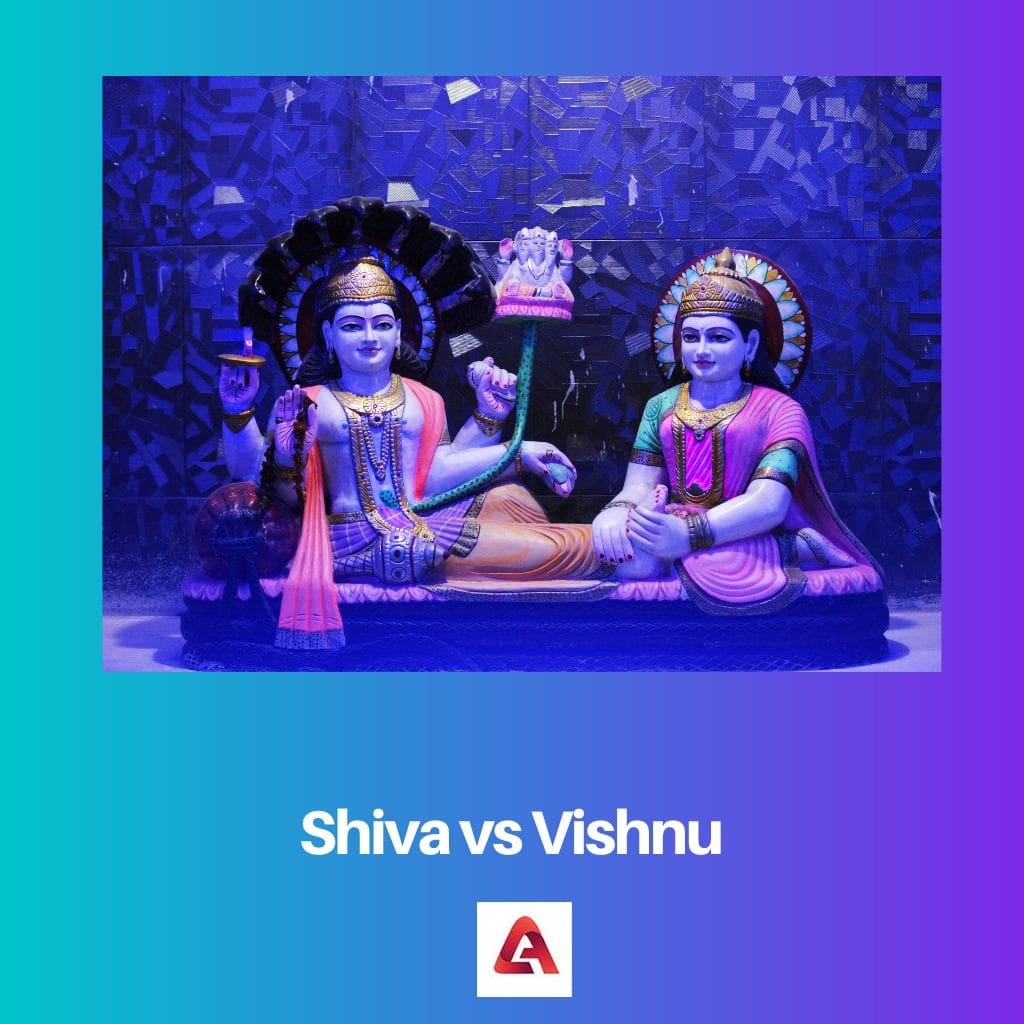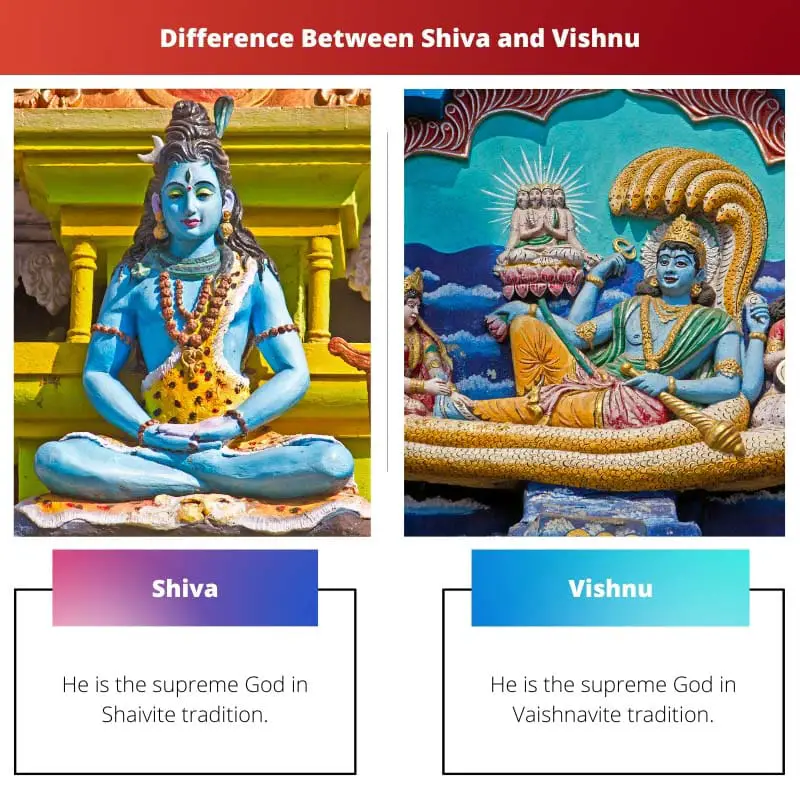In Hindu mythology, there are numerous divine Gods and Goddesses. However, Shiva, Vishnu and Brahma are called the Trimurti together.
It is because they are assumed to be the supreme God of divinity. Moreover, Shiva and Vishnu are not different. They are just like two sides of the same coin.
Key Takeaways
- Shiva is one of the principal deities in Hinduism, known as the destroyer and transformer, while Vishnu is the preserver and protector of the universe.
- Shiva embodies change, destruction, and regeneration, whereas Vishnu represents stability, order, and maintenance of the cosmic balance.
- Shiva and Vishnu are revered as part of the Hindu trinity, along with Brahma, the creator, and each has a distinct role in the cosmic cycle.
Shiva vs Vishnu
Shiva is one of the principal deities in Hinduism, known as the god of destruction and regeneration. Vishnu is considered the preserver and protector of the universe. While Shiva is associated with asceticism, yoga, and meditation, Vishnu is revered for his benevolence towards humanity.

Shiva means the Auspicious one. In Sanskrit, he is called the Great God. He is also called the Adi yogi Shiva and is a patron of meditation, yoga and arts.
In Shakta tradition, Parvati is the complementary half of Shiva. People worship Shiva in India, Nepal, Sri Lanka, Java and Bali.
Vishnu means the pervader. He descends on Earth in incarnations whenever evil and chaos is on their high and restores Dharma. In Shakta tradition, Lakshmi is the complementary half of Vishnu.
There are ten primary incarnations of Vishnu known as Dashavatara. People worship Vishnu in India, Nepal, and Southeast Asia.
Comparison Table
| Parameters of Comparison | Shiva | Vishnu |
|---|---|---|
| Tradition | He is the supreme God in Shaivite tradition. | He is the supreme God in Vaishnavite tradition. |
| Designation | People designate him as the destroyer. | People designate him as the preserver. |
| Abode | He resides in Kailash or Cremation grounds. | He resides in Vaikuntha or Kshira Sagar |
| Weapons | He holds weapons like Trishula, Pinaka bow and Pashupatastra. | He holds weapons like Sudarshana Chakra, Kaumodaki, Conch, Nandaka sword and Sharanga bow. |
| Other names | Shankar, Mahadev, Rudra, Mahesha, Bholenath, Sadasiva, Bhole, Batara Guru | Govinda, Narayana, Madhava, Madhusudana, Keshava Shridhara, Padmanabha, Damodara, Vasudeva, Pradyumna, Aniruddha, Purushottama, Narasimha, Hari, Ananta |
Who is Shiva?
Shiva, also known as Mahadev, is a principal deity in Hinduism. He is the supreme God in Shaivism, a subsect of Hinduism. Hindu mythology regards him as the God of death and time. He is known for his furious Tandav dance.
The belief in Shaivism is that Shiva creates, transform and protect the whole Universe. Preachers believe Shiva to be “The Destroyer” within the holy Trimurti.
He is known to have pre-Vedic tribal roots. The figure of Shiva is a blend of Vedic and non-Vedic deities into a single one.
Shiva has two types of depictions- benevolent and fearsome. In the former, the kind-hearted Shiva is an omniscient Yogi who lives a monastic life on Mount Kailash.
This depiction presents him as a householder, with his wife Parvati and kids, Kartikeya and Ganesha. The latter depicts him as killing demons clad in destructive incarnations. Shiva possesses the quality of Tamas.
The typographic features of Shiva show a serpent around his neck, river Ganga flowing from his tangled hair, a crescent moon adorning his hair, the third eye on his forehead, a damaru drum in his hand and a huge Trishul as his weapon.
Commonly, people worship him in the aniconic lingam form. His mount is the bull called Nandi.

Who is Vishnu?
Vishnu, also known as Narayana, is a principal deity in Hinduism. In the Vaishnavite tradition of Hinduism, he is the most important God. Hindu mythology regards him as the God of Preservation.
The Vaishnavites believe that Vishnu creates, transforms and protects the Universe. Preachers designate Vishnu as “the Preserver” within the divine Trimurti.
He once took the form of an enchantingly beautiful woman dancer called Mohini to deceive the demons.
Vishnu has two types of depictions- benevolent and fearsome. The former depicts Vishnu as an omniscient resting on his serpent, Adishesha floating, amidst the ocean with his wife, Lakshmi.
The latter describes him as taking Dashavatara to end evil and confusion in the world. Vishnu possesses the quality of Sattva.
The typographic features of Vishnu show him a blue or black coloured well-jewelled man. His portrayal sometimes shows him with two hands or sometimes with four hands.
Each hand holds a shankha, Sudarshana chakra, a kaumodaki Gada and a lotus.
People worship him in his different dashavatara form, of which Rama and Krishna are well-known.His mount is Garuda or Shesha. According to a belief, there are 108 pilgrim places of Vishnu.
Main Differences Between Shiva and Vishnu
- In Shaivism, Shiva is the creator, protector and transformer of the Universe. In Vaishnavism, Vishnu is the creator, protector and transformer of the Universe.
- In the Trimurti version of supreme divinity, Shiva is the destroyer, and Vishnu is the Preserver.
- Another belief is that Shiva is not a God but a Godly one, whereas Vishnu is the only God.
- Shiva is the heart of the body, which is empathetic, compassionate and free from the clutches of societal prejudices. Vishnu symbolizes the mind as being analytical, alert, logical and righteous.
- Shiva has both Vedic and non-Vedic tribal roots, while Vishnu is a Rigvedic God.

- https://www.inderscienceonline.com/doi/abs/10.1504/IJICBM.2011.042321
- https://papers.ssrn.com/sol3/papers.cfm?abstract_id=1559256
